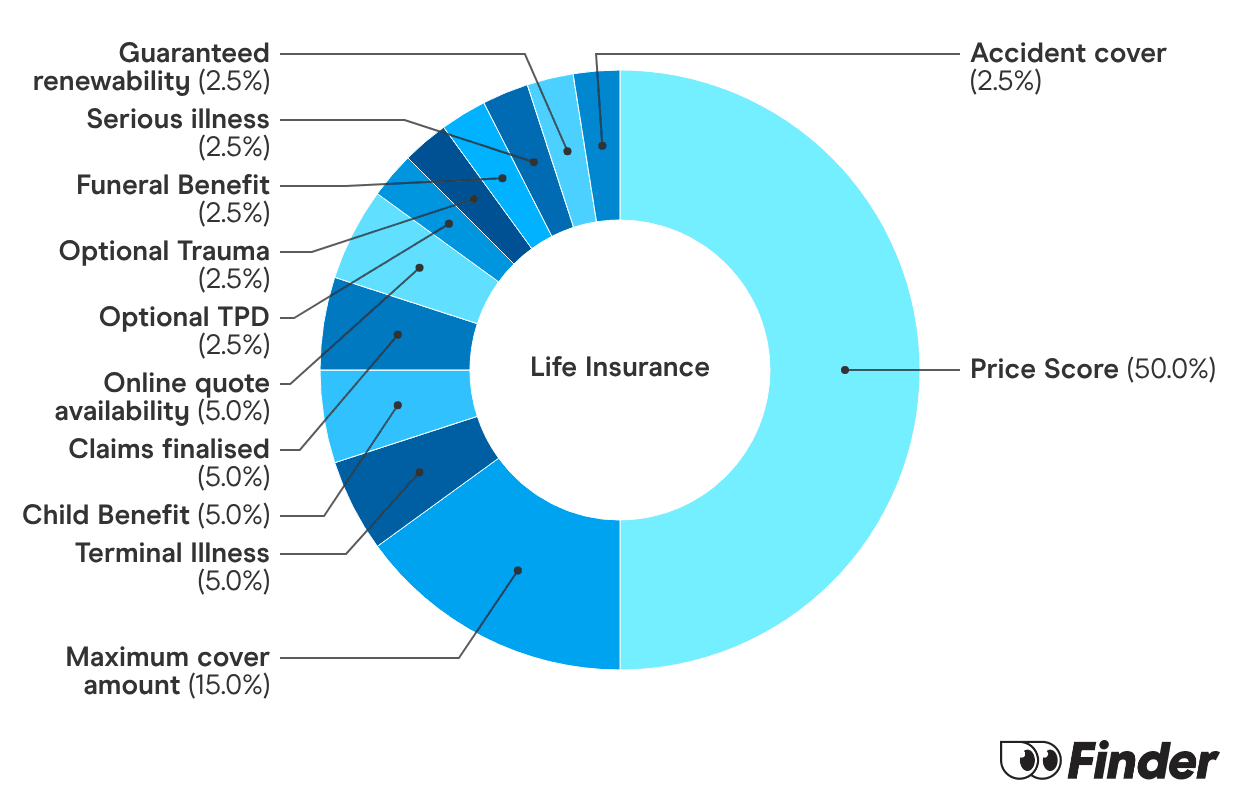Most types of life insurance are not tax deductible. This is because, according to the ATO, insurance premiums aren't tax deductible if the policy pays a benefit for physical injury. But there are a couple of exceptions such as income protection and TPD held inside super.
Which types of life insurance are tax-deductible?
Here's a brief overview of when life insurance is and is not tax-deductible. 'Premiums' refers to the monthly (sometimes annual) fee you pay to have a policy; 'benefits' refers to the money you get when an insurer pays out for a claim.
| Type | Are premiums tax-deductible? | Will I pay tax on benefits? |
|---|---|---|
| Life insurance (outside super) |
|
|
| Life insurance (inside super) |
|
|
| Trauma (outside super) |
|
|
| TPD (outside super) |
|
|
| TPD (inside super) |
|
|
| Income (outside super) |
|
|
| Income (inside super) |
|
|
Is life insurance tax deductible through super?
Generally, no. The Australian Taxation Office (ATO) states that premiums on insurance policies taken through super accounts are not personally tax deductible.
This is because the cost of the insurance comes from your superannuation balance, rather than your income. As such, any life insurance you have through your super is not tax deductible.
However, this may vary if you have a self managed super fund. To learn more about claiming tax deductions on insurance premiums within a self-managed super fund, it's best to contact a tax accountant or financial adviser.
Is life insurance tax deductible outside of super?
Usually, no. Life insurances such as death cover, TPD and trauma insurance is usually not tax deductible outside of super.
However, the premiums you pay for income protection insurance are tax deductible if you buy the policy outside of your super fund. This is because the premiums you are paying relate to your income.
According to the ATO, insurance premiums aren't tax deductible if the policy pays a benefit for physical injury. So that rules out everything except income protection insurance.
Are life insurance benefits taxed in Australia?
This depends on the type of policy you take out. For income protection insurance, it's likely that you'll have to pay tax on the monthly benefits you receive, just like you would with your regular income.
However, other life insurance policies are usually tax free. If the payment is made to a financial dependent, like a spouse or child, it will almost definitely be tax free. This can include life insurance (death cover), trauma insurance and total and permanent disability insurance.
The exception is when life insurance is purchased via a super fund and the benefit is paid out to an adult who is not classed as a financial dependant. In that case, the tax-free status could change and the beneficiary could be taxed up to 30%.
The 4 main types of life insurance
Life (or death) insurance
Pays a lump sum to your family if you die. Will usually pay out early if you are diagnosed with a terminal illness.

TPD insurance
Pays a lump sum if you suffer a severe illness or accident that prevents you from ever working again.

Trauma insurance
Pays a lump sum if you suffer a major medical event such as a heart attack, cancer or stroke.

Income protection
Provides regular payments, usually monthly, which replace your income if you're unable to work for a while.
Compare life insurance policies outside of super
Compare other products
We currently don't have that product, but here are others to consider:
How we picked theseFinder Score - Life Insurance
Life Insurance is a little complicated and a lot overwhelming. That's why we made the Finder Score, to make it easier to compare Life Insurance products against each other. Our experts analysed over 30 products and gave each one a score out of 10.
But a higher score doesn't always mean a product is better for you. Your situation is unique, so your policy choice will be too. Don't think of Finder Score as the final word, but as a good place to start your life insurance comparison.
If you prefer, speak to an insurance specialist to find the best policy for your needs
Ask a question
4 Responses
More guides on Finder
-
Budget Direct Life Insurance review
Budget Direct's life insurance offers a high maximum cover limit, decent policy add-ons and competitively-priced cover.
-
Best Life Insurance Australia
Read our comprehensive guide to finding the best life insurance policy for your situation.
-
ahm life insurance review
Read our comprehensive review of ahm Life Insurance to find out if it's right for you.
-
Life insurance rewards programs
Here are some of the health reward programs and discount schemes available from Australian life insurance brands.
-
TAL Life Insurance Review
Compare TAL life insurance policies and receive a quote for cover for the different policy options available.
-
Life Insurance Deals and Discounts February 2026
Find the latest life insurance deals and discounts from Australian brands.
-
Medibank Life Insurance Review
Choose a flexible life insurance policy that meets your needs with Medibank life insurance.
-
AAMI Life Insurance Review
Compare policies on offer from one of Australia's leading general insurance providers, AAMI.
-
Is life insurance worth it?
Having the right life insurance policy is invaluable if something happens to you unexpectedly. Find out what makes your policy worthwhile.
-
NobleOak life insurance review
Looking for a direct insurance company that offers affordable, straightforward cover options? Discover the benefits of NobleOak life insurance.


If I am a business owner and have a life insurance policy which is owned by me personally (not the company) but as part of my salary package they fund my insurance premiums; are the premiums deductible to the business and/or do they have to pay FBT?
Hi Karlz!
Did you get your life insurance inside a super? If so, yes, you claim these deductions in the income tax return for your business entity or, if you’re a sole trader, in your personal tax return. Providing insurance cover may also be considered as a residual fringe benefit.
We recommend that you consult a tax adviser on this matter for further assistance.
Hope this helps.
Cheers,
Jonathan
Are life insurance premiums tax deductible when taken out with a bank to cover Business Loans with that bank.
Hi Nicola,
Thanks for your question.
Generally, life insurance premiums are not tax deductible, unless it is funded through superannuation.
Kindly note that this is just a general advice. For your specific situation, you may have to directly get advice from a tax specialist.
Cheers,
Anndy